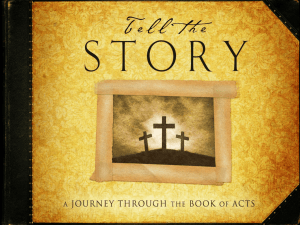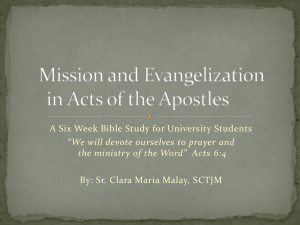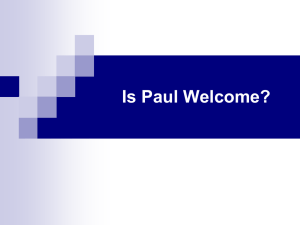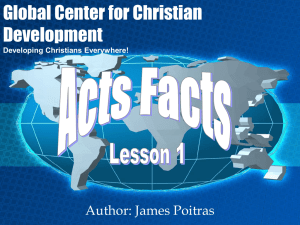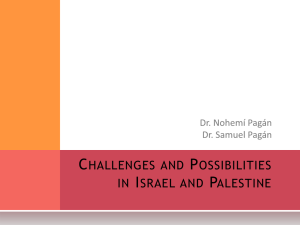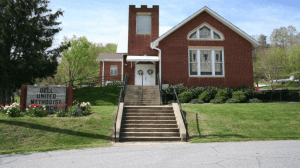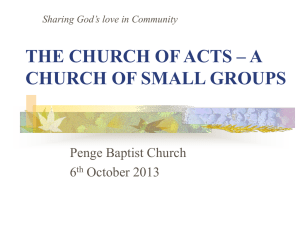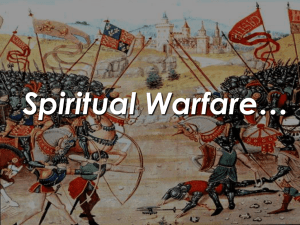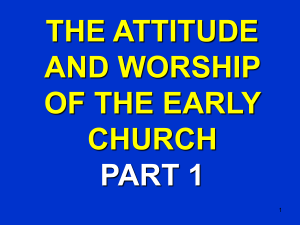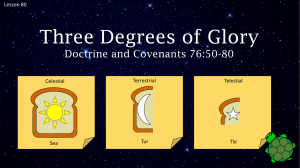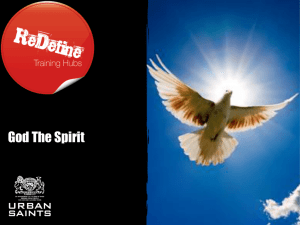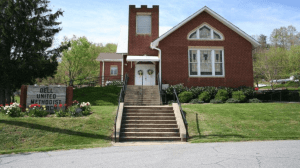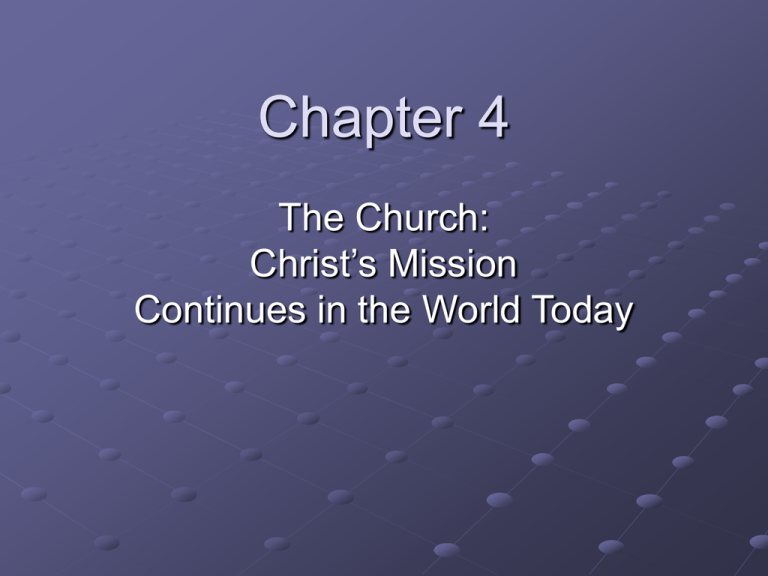
Chapter 4
The Church:
Christ’s Mission
Continues in the World Today
Biblical Images of the Church
Vine and the Branches
the branches need to be attached to the vine
We need to be attached to the Church
Body of Christ
Just like the human body – all connected
Christ is the head
We are the members of the body
Bride of Christ
The groom loves his bride
Christ loves his Church and is faithful to it
Temple
God dwells in the temple
God dwells in the Church
Good Shepherd
The good shepherd lays down his life for his
sheep
Christ lays down his life for us ( the Church)
Leaven
When the yeast works – the bread rises
The church spreads throughout the world- for
all people
5 Modern Models of the
Church
Community
Herald
Sacrament
Institution
Servant
•Sacrament
Servant
Institution
Sacrament
Community
Herald
Herald
Community
Institution
Servant
Community
Sacrament
Institution
Community
Edith Stein /
Sr. Teresa Benedicta of the Cross
St. Edith Stein
Born in Breslau, Germany,
Edith Stein was murdered in
the Nazi death camp of
Auschwitz, Poland. She
dedicated her life to a pursuit
of truth, drawing first on her
roots in Judaism. She went
from adolescent agnosticism to
the study of philosophy, to
Catholicism and ultimately to
life as a Carmelite. She served
God with prayer, scholarship
and dedication to her fellow
human beings.
What is the Church
Origins of the Church
Began with Adam and Eve
The Church was formed – covenant with
Abraham
Church was inaugurated – preaching of the
Good News
Church was born- from the pierced heart of
Christ on the Cross (St. Ambrose)
The Origins of the Church
The
TheChurch
Churchbegan
began
The Church began
The Church was
inaugurated
The Church
was formed
The Church
The Church was born
was born
Pentecost – birthday of the Church
Made visible to the world
Completed all covenants
Jesus prepared Apostles for it
Descent of the Holy Spirit
Feast of the first fruits – 50 days after Passover
Spoke many languages
To Apostles and Mary
Feared arrest and death
Over 3000 baptized
Pentecost
The Church became
visible to the whole
world.
The Holy Spirit came
to make the Church
holy and to lead her in
her mission.
Welcoming Gentiles
Vision by St. Peter
Apostles heard the word
Council of Jerusalem – first council
Only 3 Jewish laws required
Not to eat meat sacrificed to idols
Not to eat strangled animals
Avoid illicit sex
Required faith and baptism
Spreading the Good News
Called the New Way
Benefited from Roman roads
St. Paul
Saul: a tentmaker, a
Pharisee, a Roman
citizen, a persecutor of
Christians, an educated
man.
Paul: the greatest
missionary for the early
Church.
The Apostle to the
Gentiles.
St. Paul
Had been a merchant from Tarsus
Raised as a Pharisee
Persecutor
Roman citizen
Conversion
Could speak Greek as well
3 missionary journeys
Wrote letters- Epistles
Arrested and charged
Right to be tried in Rome
Beheaded in Rome in 67
By end of 4th century- Christianity had become official
religion of Roman Empire
Journeys and Letters of St. Paul
Proclaimed to all Gentiles
Gospel- source of truth
Orally
Then written
Apostles appointed Bishops as their
successors – teaching authority
Christ personally chose the Apostles
Appointed Peter as head – keys to the Kingdom
Commissioned Apostles to interpret
authentically God’s Word- Scripture and
Tradition
Extends to Pope and bishops in communion (
union) with him
Magesterium – teacher- teaches with God’s
authority
Defines a dogma – Catholics obliged to believe
A Single Deposit of Faith
God wants everyone to be saved.
Jesus Christ is the final revelation of God.
The faith is handed on through Scripture and
Tradition.
Mystery of the Church
Mystery of Faith- means and a goal of
God’s love for us
2 essential elements
Human- the visible element
Divine- God’s life
Church as sacrament – visible sign of invisible
grace
Pilgrim Church- on a journey to God
The Mystery of the Church
Pope Paul VI called
the Church “a reality
filled with God’s
hidden presence.”
The Church is a
mystery and a
sacrament where the
human and the
divine meet.
People of God
More than an ethnic, political, or cultural
group
Origin in Chosen People of Israel
Distinct characteristics
Church is of God
Membership not by birth
Baptism by water and the Spirit
Christ is the head
Holy Spirit lives within
Law- love as I have loved you
Mission- salt of the earth & light of the world
Destiny is God’s Kingdom
Membership is through faith
Participate in 3 offices of Christ- priest,
prophet, king
Priest- offers sacrifice
Prophet – witness – word & action
King – but not one who is served but who serves
(even to his life)
The Three-fold Offices of Christ
Marks of the Church
History
Constantinople – 381 – one, holy ,
catholic,apostolic
The Church is One
Unity in the Trinity.
The same creed.
Jesus died to save
all of us.
A common worship
and sacraments.
The Holy Spirit
continues to fill
each of us.
Recognition of the
Magisterium.
One
Source – unity in Holy Trinity
Founder – Jesus
Guidance of Holy Spirit
One creed
Common worship – including 7 Eastern Rite
Churches
Recognition of bishops as successors of the
apostles
But diverse in its unity- race, culture,
language, unique gifts
One leader
Ruptures in Church unity
Dates back to St. Paul
Sinfulness on both sides
Heresy – denying a truth of the faith
Apostacy-abandoning the faith
Schism- break in the Church
Great Schism
1054
Constantinople
Still many of same doctrines, sacraments, Mass,
devotions
Formed Orthodox Church
Did not accept Pope as leader
Protestant Reformation
Martin Luther- Germany- Lutheran
John Calvin – Switzerland, John Knox - ScotlandPresbyterian
Henry VIII – England – Anglican Church
We have a great deal in common- Trinity, Bible, Prayer,
Baptism, moral code, service to the needy
Brothers and sisters in Christ
Repairing Christian Unity- Ecumenisn
Remain faithful to own vocation
Living holy lives
Common prayer with other Christians
Knowledge of each other
Study own faith
Dialogue by theologians
Work together in service
Pray for Unity
“so that they may
all be one, as you,
Father, are in me
and I in you.”
Ecumenism is the
name given to the
efforts to build unity
among all
Christians.
The Church is Holy…
because she is the Body of Christ.
because the Holy Spirit dwells in her.
because of her intimate connection with God.
The way to holiness is love. We become holy
through acts of penance and seeking
forgiveness for our sins.
Holy
Not because of anything we do
Holiness comes from God
Ways to holiness
Love
Special love for children and the poor
Love enemies
We are a Church of sinners
Steps to overcome sinfulness
Eucharist
Reconciliation
Communion of Saints
On Earth - The Pilgrim
Church
In Purgatory - The
Church Suffering
In Heaven - The Church
in Glory
Communion of Saints
Saints in heaven
Intercede for us
Act as models
Mary- Mother of the Church
Saints on earth
Pray to saints in heaven
Pray for saints in purgatory
Saints in Purgatory
Will be united with God
Canonization
Study lives
Signs from God – 2 miracles
The Church is Catholic
The Church is catholic or universal – for all
people everywhere.
Although the Church is for everyone, not
everyone belongs to the Church in the same
way.
Other Christians do not profess the Catholic faith
in totality.
Muslims share with Catholics a belief in the one
Creator God, and devotion to Abraham, our
Father in faith.
Catholic
Universal- for everyone
Jesus died for all
Not all belong to Church in same way
Baptized and practicing Catholics
Other Christians- joined to Church in many ways
Jewish people- predecessors in faith
Muslims- believe in 1 Creator God
Those who have not heard the Good News
Non Christians- shared humanity
To the ends of the Earth
Missionary mandate
Americas in 16th-17th century
Some abuses – language, forced conversion
Many stood up for the rights of the people – Junipero
Serra
Peter Claver- slaves in Columbia
Martin de Porres – lessen evils of slavery
Jesuits- preserve culture while educating
Focus on social justice
Local- diocese, parish
In union with Magesterium
The Church is Apostolic
The Church was founded on
the Apostles chosen by Jesus
himself.
She continues the mission
given by Jesus to the Apostles.
She teaches the same things
the Apostles taught.
Her leaders are the successors
of the Apostles.
Apostolic
Ministry of Apostles
Still teaches what the Apostles taught
Leaders are successors
3 degrees of Holy Orders – bishop, priest,
deacon
Religious and laity
Role of Hierarchy
Peter clearly made leader
With Paul founded the Church in Rome
Became primary Church
The Magisterium
The official teaching
authority of the
Church composed of
the Pope and the
bishops united with
him.
The Magisterium
teaches with Christ’s
own authority.
The Holy Spirit bestows
the gift of infallibility on
the Magisterium when
teaching doctrine or
morals ex cathedra or in
an ecumenical council.
Magestrium- teaching authority of the Church
Bishops & priests share with the Pope the authority
to teach in Jesus nsme
Found in documents, encyclicals, pastoral letters,
homilies
Infallibility
Pope is protected from error by the power of the
Holy Spirit when speaking ex cathedra ( from the
chair of Peter) on matters of Faith and Morals
Also Ecumenical (worldwide) Council in union with
the Pope
Religious Life
Evangelical counsels- poverty, chastity, obedience
May be members of hierarchy or laity
Laity and Religious
The laity includes any
baptized Catholic who
has not received Holy
Orders, and who is not
a member of a religious
order.
Members of religious
orders take vows of
chastity, obedience, and
poverty.
Laity
Not 2nd class citizens
Own role as priest, prophet, king
Baptized Catholic- no Holy Orders or vows
We are called to be the salt of the
earth and the light of the world.

